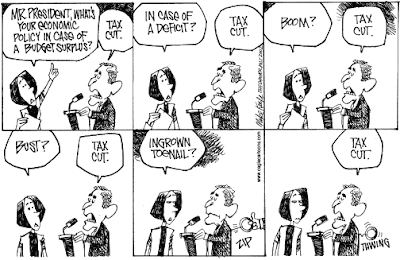 At times I wondered if Mike Keefe didn't have it right given that Bu$hCo was all about cutting taxes it seemed. That their tax cut was the first in a time of war and favored the elite has been something covered be plenty. The following appears in the link below:
At times I wondered if Mike Keefe didn't have it right given that Bu$hCo was all about cutting taxes it seemed. That their tax cut was the first in a time of war and favored the elite has been something covered be plenty. The following appears in the link below:The first major economic initiative pursued by the president was a massive tax cut for the rich, enacted in June of 2001. Those with incomes over a million got a tax cut of $18,000—more than 30 times larger than the cut received by the average American. The inequities were compounded by a second tax cut, in 2003, this one skewed even more heavily toward the rich. Together these tax cuts, when fully implemented and if made permanent, mean that in 2012 the average reduction for an American in the bottom 20 percent will be a scant $45, while those with incomes of more than $1 million will see their tax bills reduced by an average of $162,000.
Via Vanity Fair, Nobel laureate, Joseph E. Stiglitz, sees a generation-long struggle to recoup our losses in his The Economic Consequences of Mr. Bush. A "reckoning" indeed and yet I also appreciated how he also blames Clinton and the American public for the mess we are in. There are solutions offered as well. Near the end he writes:
What is required is in some ways simple to describe: it amounts to ceasing our current behavior and doing exactly the opposite. It means not spending money that we don’t have, increasing taxes on the rich, reducing corporate welfare, strengthening the safety net for the less well off, and making greater investment in education, technology, and infrastructure.
When it comes to taxes, we should be trying to shift the burden away from things we view as good, such as labor and savings, to things we view as bad, such as pollution. With respect to the safety net, we need to remember that the more the government does to help workers improve their skills and get affordable health care the more we free up American businesses to compete in the global economy. Finally, we’ll be a lot better off if we work with other countries to create fair and efficient global trade and financial systems. We’ll have a better chance of getting others to open up their markets if we ourselves act less hypocritically—that is, if we open our own markets to their goods and stop subsidizing American agriculture.
Some portion of the damage done by the Bush administration could be rectified quickly. A large portion will take decades to fix—and that’s assuming the political will to do so exists both in the White House and in Congress.
Peace ... or War!
No comments:
Post a Comment